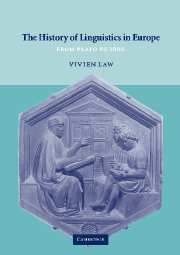Book contents
- Frontmatter
- Dedication
- Contents
- List of illustrations
- List of maps
- List of boxes
- Preface
- 1 Getting ready to study the history of linguistics
- 2 Greek philosophy and the origins of western linguistics
- 3 Towards a discipline of grammar: the transition from philosophy
- 4 From literacy to grammar: describing language structure in the ancient world
- 5 Christianity and language
- 6 The early Middle Ages
- 7 The Carolingian Renaissance
- 8 Scholasticism: linking language and reality
- 9 Medieval vernacular grammars
- 10 The Renaissance: discovery of the outer world
- 11 A brief overview of linguistics since 1600
- 12 Becoming a historian of linguistics
- Research resources in the history of linguistics
- Notes
- Index
9 - Medieval vernacular grammars
Published online by Cambridge University Press: 05 March 2015
- Frontmatter
- Dedication
- Contents
- List of illustrations
- List of maps
- List of boxes
- Preface
- 1 Getting ready to study the history of linguistics
- 2 Greek philosophy and the origins of western linguistics
- 3 Towards a discipline of grammar: the transition from philosophy
- 4 From literacy to grammar: describing language structure in the ancient world
- 5 Christianity and language
- 6 The early Middle Ages
- 7 The Carolingian Renaissance
- 8 Scholasticism: linking language and reality
- 9 Medieval vernacular grammars
- 10 The Renaissance: discovery of the outer world
- 11 A brief overview of linguistics since 1600
- 12 Becoming a historian of linguistics
- Research resources in the history of linguistics
- Notes
- Index
Summary
What is a vernacular grammar?
To many people nowadays the word ‘vernacular’ means ‘colloquial’ or ‘informal’, smacking of street usage, graffiti, perhaps obscenity – certainly not the sort of thing you'd expect to find in a grammar. ‘Vernacular’ contrasts with ‘formal’, one's linguistic Sunday best; in contemporary English, the distinction is more a matter of register than anything else. In medieval Europe the situation was more complex. The Italian poet Dante described the vernacular in 1304 as the language which we pick up from those around us without any rules. In the Italy of Dante's day, some dialect of Italian would have been the local vernacular; across the Alps, in Germany, some form of Middle High or Low German would have fulfilled that role, while in France Old French and Occitan, and in England Middle English and Anglo-Norman French were the most widespread vernaculars. Although little by little all these languages were coming to be used in writing, they were still far from offering serious competition to Latin. Latin maintained its status as the language of serious written scholarship and of international communication to the end of the Middle Ages and well beyond. Latin, Greek and Hebrew were regarded as qualitatively very different from any vernacular; as Dante puts it, ‘We also have a secondary form of speech called grammar by the Romans … Few people succeed in mastering it, for we learn its rules and doctrine only by devoting much time and effort to it.’
- Type
- Chapter
- Information
- The History of Linguistics in EuropeFrom Plato to 1600, pp. 190 - 209Publisher: Cambridge University PressPrint publication year: 2003

